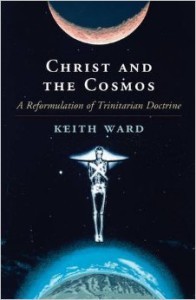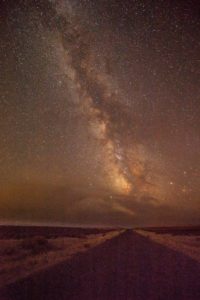The Triune God Everlastingly Creates, Relates, and Loves
This the fourth and final installment in my blog review of Keith Ward’s book, Christ and Cosmos. In the first installment, I noted that Ward thinks the social Trinity is a “bad idea.” I agreed, and I noted the helpfulness of Ward’s general doctrine of God, which comes from an open and relational perspective.
In the second installment, I addressed why the idea of the social Trinity is attractive to many Christians. It offers a way to say God is essentially relational and loving, because God has been everlastingly loving and relating within the Trinity. If God’s name and nature is love, we will likely feel drawn to a view that says God is essentially relational love. But… most if not all versions of the social Trinity sound more tritheistic than monotheistic. That presents a problem for Christians.
In the third installment, I looked at the idea that God necessarily loves, creates, and relates to creation. Ward toys with these ideas, but he does not finally embrace them. He thinks affirming these notions requires us to speculate too much about God’s nature. He’s wary of speculations about God’s essence. I’m willing to make such speculations, although I respect Ward’s wariness on these matters.
I concluded the third installment with a teaser. I said I’d offer a view of the Trinity in which God necessarily loves, creates, and relates to creation, but this Trinitarian God is not internally social.
It’s time to make good on my promise.
The God Who Necessarily Creates, Relates, and Loves
It makes most sense to me to believe that God necessarily creates. We have good reasons to speculate that God has always – everlastingly – been creating out of that which God previously created. Creating is what God does, because creating is an essential aspect of God’s nature.
If God necessarily creates and has been doing so everlastingly, we can also speculate that God is necessarily relational. God has always been creating and relating to creaturely others. God’s relation to creation is “natural,” to use Ward’s language. It is “necessary,” to use mine.
And if God necessarily creates others and necessarily relates to them, it’s easy to also see how a God whose nature is love also necessarily and everlastingly loves creatures. The essentially creating and relating God always has creaturely others to love.
What does Ward think of this general view?
A God Who Necessarily Creates Can Still Be Free
Unlike me, Ward does not embrace the idea that God necessarily creates. But he does argue that the typical criticisms of the view are unwarranted.
For instance, Ward wards off the criticism that a God who necessarily creates could not be free. “Logically speaking,” says Ward, “the necessary creation of some universe of finite persons would not impugn the divine freedom, and it would leave the creation of this specific universe and the persons in it as a truly free divine act” (182). I agree.
In Christ and the Cosmos, Ward quotes Norman Kretzmann favorably on this point: “God’s will is necessitated as regards whether to create but fully free as regards what to create” (255). A God who everlastingly creates has freedom – although Ward and I would agree that divine love constrains this freedom – to create various creatures or universes.
On this point, open and relational theologies offer a crucial part of an explanation for how a necessarily creating God can also be free. If the future were complete and settled, a necessarily loving God would have no freedom whatsoever. But an open future not divinely foreknown means that God chooses freely among loving options when creating. God cannot “crunch the numbers” to know with certainty which option will ultimately produce well-being to the greatest extent. Consequently, God freely chooses among the best available options in any moment.
According to my view, of course, God is not free not to create at all. To put it positively: God must create. But what creatures God creates is freely chosen in relation to God’s love for creation, both its current creatures and future possibilities.
In short, a God who necessarily creates can also be free in the specifics of creating.
A God Who Necessarily Relates to Creation is Not (Imperfectly) Dependent
Unlike me, Ward does not embrace the idea that God everlastingly relates to creation. But he wards off a common criticism of the idea.
Some have argued that a God who necessarily relates to creatures is imperfectly dependent upon creation. Ward says that God creating, relating, and loving creation “does not…make God dependent on creation. It is God alone who wills that creation should exist as a condition of realizing the divine nature as love. That is not a question of God being dependent on something completely independent of God” (194).
In a related passage, Ward says that “if some creation was necessary to God, that would not make God dependent upon something other than God. God would still be the creator of everything other than God, and creation would then be an essential divine property, rather than as I think it is, a contingent and gratuitous act of divine grace” (220-221).
God would be imperfectly dependent upon creation if God’s existence could be nullified by creatures. But along with just about every other theology, I believe God exists necessarily. God can both exist necessarily and relate to creation necessarily.
Unlike me, Ward affirms the first of these statements but not the second. But he agrees that the two can be affirmed simultaneously. To exist, God does not depend upon creation. But God can both exist necessarily and relate to creatures necessarily.
Must Creatures Be Eternal?
A third common criticism of the ideas that God necessarily and everlastingly creates is that these ideas require an eternal universe. Ward does not ward off this criticism. And his comments about God necessarily creating make me wonder if it worries him.
Ward writes, for instance, that “love may be God’s nature, but even supposing that such love entails that God must create an object for God to love, it seems obvious that this object must be genuinely other than God and need not exist everlastingly but only for a finite time” (194).
Although I’m not sure what he thinks is obvious really is so, I agree with Ward. The creatures God creates do not exist everlastingly but only for a finite time.
But Ward’s argument doesn’t undermine the view that God everlastingly creates. After all, God could everlastingly create creatures, one after another, who each exist for a finite time. No one creature would be essential to God’s nature. And each would be contingent. Each creature, world, or universe, to use Ward’s words, “could have been different or might not have existed – God did not have to create this universe in particular” (19).
According to the view I’m proposing, God’s relating to contingent creation would be essential to God. And God would everlastingly be creating contingent creatures whom God loves. But no individual creature or universe would itself be eternal.
Of course, accepting that God everlastingly creates out of creation in love would mean rejecting creatio ex nihilo. But I don’t think Ward would worry too much about foregoing creatio ex nihilo. There’s no explicit reference to the doctrine in the Bible. And many in the Christian tradition has embraced it for reasons that, as I mentioned above, Ward would not likely think legitimate. Besides, Ward could embrace an alternative view, something like what I have propose: creatio ex creatione en amore (God always creates out of creation in love).
Saying God always creates out of creation and has been doing so everlastingly also provides Ward a way to avoid saying that God is the source of evil. Ward rightly says the possibility for evil emerges by necessity. But affirming a God who necessarily and everlastingly creates from what God previously created offers means that the possibility for evil is necessary among creaturely action. After all, some creaturely causation is also always at play when God creates.
Conclusion: God Essentially Loves Ad Extra
Keith Ward is right about so much of what he says in Christ and the Cosmos. I commend him for this book!
But I encourage him to endorse the idea that God necessarily and everlastingly creates creaturely others. I encourage him to say that such creating creaturely others is part of what it means to say God essentially loves.
The God who has everlastingly been creating out of that which God previously created and relating to this creation is a God for whom relational love is an essential attribute. If we endorse this view, we need not be tempted to embrace the concept of the social Trinity.
I like Ward’s view of the Trinity: God is expressed simultaneously in three ways toward creation. And I agree that we should not think God is essentially related and essentially loving “ad intra” among three divine persons. But I propose we speculate that the Triune God is essentially related and essentially loving “ad extra” with creation.

Comments
Hi Tom,
Thanks again for your interesting posts on the topic of the Trinity. I tried to get your thoughts earlier this year (see comment 11 https://thomasjayoord.com/index.php/blog/archives/rethinking-trinity) but I think I was a bit late to the party and you were busy with other things. I really support your efforts to show the error of viewing God as controlling and coercive but guess my question is still the same i.e. in getting rid of the social Trinity are you not left with the distant and capricious deity that you are trying to avoid?
My thinking on this is that if God ‘must’ be related to a world then we are talking about generation instead of creation (ex nihilo). This means that either the creator/created distinction collapses which gives us a social trinity after all (think the Father/God eternally generating the Son/world here), Or alternatively the world now receives it’s ontological basis from the necessity that God ‘must’ create it, which means that it’s nature is now determined by God’s absolute power even if we then try and disguise this by viewing God’s activity ‘in’ the world as relational, kenotic etc.